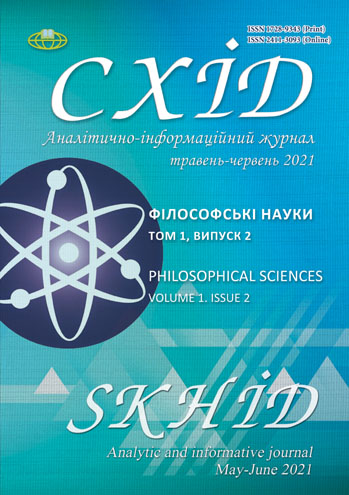COMMUNITY PARTICIPATION IN SUSTAINABLE SOIL AND WATER CONSERVATION: THE CASE OF GORO GUTUU WOREDA OROMIA, ETHIOPIA
DOI:
https://doi.org/10.21847/1728-9343.2021.1(2).235958Keywords:
community participation, sustainable soil and water conservation, Ethiopia, environmental problemsAbstract
Monitoring the importance of civic participation in the process of sustainable soil and water conservation measures in cases where irregular and unstable participation of civic/community in the process of sustainable soil and water conservation measures has been observed is taken as central problem of the study area. The sequential exploratory mixed type of research was used to answer the stated research questions; moreover, to make sure of getting reliable and valued data both primary and secondary data was collected through FGD, KII, Questionnaires and field observation. As a result, from 203 persons, 24, 12 and 167 informants participated in FGD, KII and survey respectively. The collected data was analyzed qualitatively and quantitatively through narration and statistical description respectively. The statistical significance of perception of the difference between informants gathered from three agro ecological zones of study sites was tested by Kruskal Wallist Test. This study significantly identifies the importance of community participation as it is important to develop awareness, sense of ownership, transparency and self–trust among communities in sustainable soil and water conservation activities. Also, the small size of farm leads to low level of annual agricultural income and wealth, low educational status leads to low level of awareness and health status of farming communities, reactive culture of farming communities toward conservation activities and low commitment and weak capacity of front line leaders was identified as economic, social, cultural and political factors that affect dependable participation communities in sustainable soil and water conservation activities. Accordingly, the researcher recommended that, Bureau of agriculture and natural resource office should look again and set clear strategies towards the right of ownership / the right of use of resources produced on rehabilitated closed farm land. Also, the district and zone agriculture and natural resource office should capacitate and empower the front line mobilization agent through training and motivational activities. The future researcher should give emphasis and come up with most possible alternatives which will help to minimize the effect of the small size farm land leading to low level of annual agricultural income and wealth resulted from uneven participation of community in sustainable soil and water conservation activities.
Downloads
References
Berhanu, G. and S. Swinton. (2002). Sustainable management of private and communal lands in Northern Ethiopia. In Natural resources management in African agriculture: Understanding and improving current practises (eds. Barrett, C., F. Place and A. Aboud). Pp. 77-90. Cabi Publishing
Berry, L. (2003). Land degradation in Ethiopia. Ethiopia : Addis Ababa univeristy. https://rmportal.net/library/content/frame/¬land-degradation-case-studies-03-ethiopia/at_download/file
Betru, Nedassa (2011). Highlights of MERET experiences. https://www.slideshare.net/CPWF/highlights-meretiwmi
Bezuayehu, T., Gezahegn, A., Yigezu, A., Jabbar, M.A. and Dubale, P. (2002). Nature and causes of land degradation in the Oromiya Region: A review. Socio-economics and Policy Research Working Paper 36. ILRI (International Livestock Research Institute), Nairobi, Kenya. 82 pp.
Bottom, Winter (2013). Improving land and water management in Washington . Washington: World resource institue.
Desta Gessessea, Gizaw, Klika, Andreas, Hurnib, Hans (2009). Assessment of soil erosion and soil conservation practices in Angereb watershed. Annual Conference: Biophysical and Socio-economic Frame Conditions for the Sustainable Management of Natural Resources, International Research on Food Security, Natural Resource Management and Rural Development. https://www.researchgate.net/publication/-270879819_Assessment_of_soil_erosion_and_soil_conservation_practices_in_Angereb_watershed_Ethiopia_Technological_and_land_user_context
Hurni, Hans (1993). Land degradation, famine and land resource scenarios in Ethiopia. World Soil Erosion and Conservation. Cambridge Studies in Applied Ecology and Resource Management, 27-61. https://www.researchgate.net/publication/-279605109_Land_degradation_famine_and_land_resource_scenarios_in_Ethiopia
Oromia National Plan Programs for adapting change of climate (2011). Programs for adapting change of climate. Addis Ababa: Addis Ababa Univeristy corps, M. Guide to Community Mobilization Programming.
Schiechti, H.M. (1985). FAO watershed management field manual. Vegetative and soil treatment measures. Rome. http://www.fao.org/3/ad081e/ad081e00.htm
Soromessa, T., & Gedefaw, M. (2015). Land degradation and its impact in the highlands of Ethiopia: Case study in Kutaber wereda, South wollo, Ethiopia. https://www.seman¬ticscho¬lar.org/paper/Land-degradation-and-its-impact-in-the-highlands-of-Soromessa-Gedefaw/f64f3e07aa-46241d51058cc5c5807a030f0aaf8e
Tadesse, Dawit (2014) Impacts and Impediments of Community Participation on Soil and Water Conservation to Sustainable Land Resource Management in Laelay Maychew Wereda, Tigray, Ethiopia. Masters thesis, Addis Ababa University.
Tamene, L., Park, S. J., Dikau, R., Vlek, P. L. G. (2006). Reservoir siltation in the semiarid highlands of northern Ethiopia: sediment yield – catchment area relationship and a semi-quantitative approach for predicting sediment yield. Addis Ababa: Earth surface process. https://doi.org/10.1002/esp.1338
Downloads
Published
How to Cite
Issue
Section
License
Copyright (c) 2021 KETEMA ABEBE, WAKTOLI TIKII

This work is licensed under a Creative Commons Attribution-NonCommercial-NoDerivatives 4.0 International License.
1. Authors bear responsibility for the accuracy of facts, quotations, numbers and names used.
2. Manuscripts are not sent back.
3. The publisher does not always agree with the authors' opinion.
4. The authors reserve the right to authorship of the work and pass the first publication right of this work to the journal under the terms of a Creative Commons Attribution-NonCommercial-NoDerivatives 4.0 International License. This license allows others to distribute (copy) the published work for non-commercial purposes, provided there is mandatory attribution to its authors and a link to the first publication in our journal.
5. The authors have the right to conclude separate supplement agreements that relate to non-exclusive work distribution in the form in which it has been published by the journal (for example, to upload the work to the online storage of the journal or publish it as part of a monograph), provided that the reference to the first publication of the work in this journal is included.

